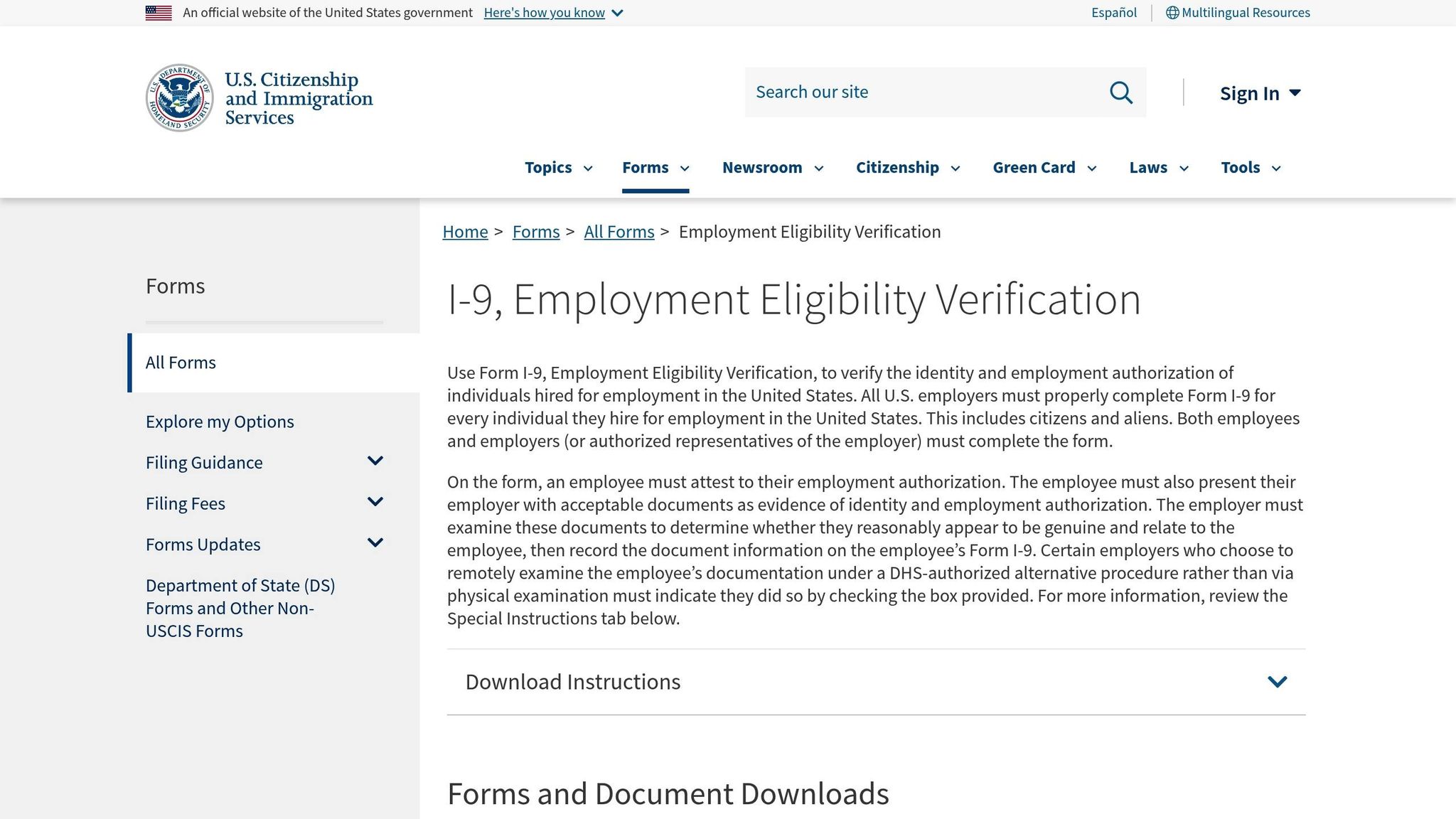How to Check Remote Work History for Offshore Hires

Hiring offshore remote workers? Start with thorough work history verification to ensure they can handle remote roles effectively. Here's how:
- Request Key Documents: Resume, portfolio, references, work certificates, proof of tool proficiency, and employment verification letters.
- Assess Remote Skills: Evaluate communication, time management, and cultural awareness through interviews and tests.
- Verify Past Employers: Confirm employment dates, responsibilities, and performance in remote roles.
- Use Professional Services: Consider expert vetting services for background checks, English proficiency tests, and cultural fit evaluations.
Remote I-9 Verification: What Employers Should Know

Getting Ready for Work History Checks
Start by collecting essential documents and creating a framework for evaluation. This preparation sets the stage for a thorough verification process.
Documents to Request from Candidates
Ask candidates to provide the following:
- Updated Resume/CV: Clearly outlining remote work roles, responsibilities, and timelines.
- Professional Portfolio: Examples of remote projects, deliverables, or accomplishments.
- Reference Contact List: Details of previous supervisors from remote roles.
- Work Certificates: Digital copies of relevant certifications or training programs.
- Proof of Remote Tools Proficiency: Documentation showing experience with key collaboration tools.
- Employment Verification Letters: Official letters from past remote employers.
Organize these documents in a secure digital folder to ensure compliance and streamline the verification process.
Checklist for Assessing Remote Work Skills
When evaluating remote work skills, focus on areas critical for success in offshore roles. Use the following criteria as a guide:
| Skill Category | Assessment Criteria | Verification Method |
|---|---|---|
| Communication | English proficiency (written and verbal) | Language assessment test |
| Cultural Awareness | Familiarity with Western work practices | Behavioral interview |
- Communication Skills: Strong English skills are a must for effective collaboration. Review samples of written communication from previous remote work.
- Remote Work Experience: Confirm that the candidate has a verifiable history of remote work in relevant fields.
- Cultural Fit: Evaluate their understanding of Western business norms and communication styles.
Keep detailed records of each verification step. For more specialized roles, include additional assessments tailored to the specific job requirements.
These steps help ensure a reliable and thorough evaluation process, supporting the goal of building strong and dependable remote teams.
Work History Verification Steps
Confirming a candidate's remote work history is crucial to understanding their experience and suitability for the role.
Past Employer Verification
Reach out to previous employers to confirm key details:
- Employment Dates: Check the accuracy of start and end dates.
- Job Responsibilities: Ensure their duties align with remote work requirements.
- Performance Reviews: Gather insights about their ability to meet deadlines and overall job performance.
- Remote Work Setup: Verify whether the role was fully remote or hybrid.
Keep a detailed record of every interaction and response. These verified details will also help guide your reference checks.
Reference Check Process
Ask references specific questions about the candidate's remote work skills and habits:
| Focus Area | Sample Questions | What to Look For |
|---|---|---|
| Time Management | How did they manage deadlines across different time zones? | Examples of meeting key milestones. |
| Communication | What tools did they use to collaborate with the team? | Familiarity with remote work tools. |
| Independence | How well did they perform without direct supervision? | Indicators of self-motivation. |
Tailor the conversation to uncover how effectively the candidate worked in a remote environment.
Document Verification Steps
Review all documents provided by the candidate to ensure they are legitimate. For any unclear or questionable documentation, consider seeking professional verification to confirm authenticity.
Professional Verification Services
For a more thorough evaluation, you can use professional services to validate remote work experience, assess English proficiency, and gauge cultural compatibility. Companies like Hey Foster specialize in these areas, providing an extra layer of confidence in your hiring decisions.
sbb-itb-d7e6fca
Remote Work Interview Guide
Conducting interviews for remote positions requires a clear approach to evaluate both past experiences and communication abilities effectively.
Past Experience Questions
| Focus Area | Interview Questions | What to Listen For |
|---|---|---|
| Remote Tools | What project management and communication tools have you used in previous remote roles? | Knowledge of commonly used tools |
| Time Management | How do you structure your workday when working remotely? | Strong organizational habits and discipline |
| Problem Resolution | Can you describe a challenging situation you faced while working remotely and how you resolved it? | Problem-solving skills and initiative |
| Cross-cultural Experience | Tell me about your experience working with teams across different time zones. | Adaptability and cultural understanding |
After discussing past experiences, focus on evaluating how candidates showcase their communication abilities during the interview process.
Communication Skills Assessment
Real-time Conversation Analysis
- Pay attention to how clearly they speak and how well they understand others.
- Evaluate their ability to explain complex ideas concisely.
- Observe non-verbal cues during video calls, such as body language and eye contact.
Written Communication Test
- Review examples of their previous work, like emails or reports.
- Assign a short writing task related to the position.
- Assess for clarity, appropriate tone, and proper formatting.
"Excellent English skills: We source talent that possess strong English proficiency, ensuring seamless and effective communication for remote collaboration." - heyfoster.com [1]
Technical Communication Exercise
- Ask the candidate to explain a technical concept relevant to their expertise.
- Evaluate how well they simplify complex ideas for a non-technical audience.
- Ensure they use accurate and relevant industry terminology.
Verification Process Standards
Effective verification processes rely on solid record-keeping practices and professional hiring services to ensure compliance and quality.
Record Keeping Requirements
To meet offshore hiring compliance standards, maintain detailed documentation of all verification activities. A centralized digital system can help manage this efficiently.
Key Documentation to Maintain
- Dates and methods used for verification
- Contact details for references and previous employers
- Summaries of conversations during verification
- Verified certificates and credentials
- Written assessments and interview notes
Digital Storage Best Practices
- Use secure cloud storage with role-based access controls
- Implement version control to track document updates
- Organize files by candidate and stage of verification
- Schedule automated backups regularly
- Align data retention policies with privacy regulations
Proper documentation ensures a reliable foundation for verification, making the process efficient and compliant.
Professional Hiring Services
After setting up robust record-keeping, consider using professional vetting services to simplify and enhance the hiring process. These services bring several advantages:
Advantages of Expert Vetting
- Comprehensive background checks
- Consistent and standardized evaluation methods
- Assurance of compliance with hiring regulations
- Faster turnaround for hiring decisions
Hey Foster provides specialized support for remote hiring, including:
- Validation of remote work experience
- English language proficiency testing
- Evaluation of cultural compatibility
- Technical skills assessments
- Professional reference verifications
Their 6-month Right Match Promise adds extra peace of mind, ensuring candidates are a strong fit for long-term success in remote roles.
Conclusion
Thoroughly verifying offshore hires involves more than just checking documents and references. It’s about confirming their ability to thrive in a remote work environment. By using a structured process, you can ensure you're bringing on board experienced remote professionals.
Beyond standard employment checks, it’s crucial to evaluate other key factors like English proficiency, cultural alignment, and the ability to work independently. A testimonial highlights this approach:
"Hey Foster made hiring offshore talent in the Philippines effortless. The process was smooth, the team was professional, and the quality of hires exceeded our expectations. Highly recommend!" [1]
Partnering with professional verification services can simplify this process while maintaining high standards. Hey Foster’s approach ensures companies can confidently build offshore teams with pre-screened, reliable professionals. These services make hiring decisions faster and more dependable.
To wrap up, keep detailed records and use expert verification solutions to create strong, low-risk offshore teams. This method lays the groundwork for successful remote team growth.
FAQs
What are the key traits that show a candidate can work independently in a remote role?
Candidates who excel in remote roles typically demonstrate extensive remote work experience and strong communication skills, especially in English. These traits ensure they can collaborate effectively and manage tasks without constant oversight.
Additionally, qualities like self-discipline, time management, and the ability to adapt to remote tools and workflows are essential for thriving in a remote work environment. Identifying these traits during the hiring process can help ensure a successful fit for your team.
How can I verify the authenticity of documents provided by offshore candidates?
To ensure the authenticity of documents provided by offshore candidates, follow these steps:
Request certified copies: Ask candidates to provide certified or notarized copies of important documents, such as diplomas, certifications, or work contracts.
Conduct reference checks: Reach out to previous employers or references to confirm the candidate's work history and credentials.
Use verification tools: Leverage background-check services or professional verification tools to validate the documents' legitimacy.
Ask detailed questions: During interviews, ask specific questions about their past roles and responsibilities to cross-check with the provided documents.
By combining these methods, you can confidently assess the trustworthiness of the candidate's documentation and ensure a reliable hiring process.
What are the advantages of using professional services to verify offshore remote workers?
Using professional verification services simplifies the hiring process by managing tasks like sourcing, screening, and vetting candidates. These services ensure that offshore hires have strong English proficiency, align well with your company culture, and possess proven remote work experience.
By relying on experts, you save time and gain confidence in hiring top-tier talent who are ready to contribute effectively to your team.